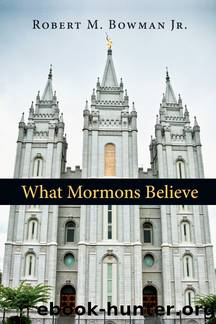What Mormons Believe by Robert M. Bowman Jr

Author:Robert M. Bowman Jr. [Bowman Jr., Robert M.]
Language: eng
Format: epub
Publisher: InterVarsity Press
Published: 2012-05-01T00:00:00+00:00
A Biblical Response
Mormons do not accept the evangelical approach of basing all church doctrine on the Bible alone. However, they appeal heavily to the Bible, along with their uniquely LDS scriptures and modern revelation, to support many of their distinctive beliefs. For that reason, it is both helpful and important to contrast the teachings of Mormonism with those of the Bible.[20]
God is not an exalted man. The linchpin of LDS theology is its view of the divine. According to Mormon doctrine, God was a man who attained exaltation to godhood and whose spirit offspring can potentially become gods with similar powers and glory. They can even become the creators and gods of their own offspring, starting the cycle all over again, ad infinitum. In sharp contrast to this view, the Bible speaks of the Lord, the God of Israel, as the only God for all ages: âBefore me there was no God formed, and there will be none after meâ (Is 43:10).
According to the Bible, the Lord did not become God by a process of exaltation but has always been God (Ps 90:2; Is 43:13; Rom 16:25-26; 1 Tim 1:17). He is by nature not flesh but transcendent spirit, not limited to any location (Is 31:3; Jn 4:20-24). The universe cannot contain God (1 Kings 8:27; Is 66:1; Acts 7:48-49). At the same time, God is present everywhere (Ps 139:7-10; Acts 17:28) and fills all things (Jer 23:23-24). Whenever the Bible does describe God in physical language, it is clear that the language is figurative. For example, the Bible says that heaven is Godâs throne and the earth his footstool (Is 66:1; Mt 5:34-35; Acts 7:49), but no one (I hope) thinks that God is literally a gigantic man tens of thousands of miles tall. Joseph Smith wouldnât have been able to see more than his big toe!
In defending their belief that Heavenly Father was originally a man, Mormons often point out that Jesus was a man, and this didnât prevent him from having divine characteristics. But this comparison overlooks a crucial difference. In Mormonism, the Father was a man who became God. In the Bible, the Son, Jesus Christ, was God and yet became a man (Jn 1:1, 14; Phil 2:6-7). Orthodox Christians do not object to the idea of God having a physical body as an abstract possibility removed from context. They object to the idea of God as a physical being who became exalted to Godhood.
God has no heavenly wife and kids. The Bible, of course, does not speak of a Heavenly Mother. (For that matter, neither do any of the LDS scriptures and neither did Joseph Smith.) And the idea that human beings preexisted in heaven as Godâs spirit children is clearly unbiblical. First, not all human beings are Godâs children (Jn 8:44). Christians are called âsons of God,â but this sonship is an adoptive status granted only to believers in Christ through the new birth effected by the Spirit (Jn 1:12-13; Rom 8:14-17; Gal 3:26â4:7; 1 Jn 3:1-2; 5:1-2).
Download
This site does not store any files on its server. We only index and link to content provided by other sites. Please contact the content providers to delete copyright contents if any and email us, we'll remove relevant links or contents immediately.
Getting It, Then Getting Along by L. Reynolds Andiric(649)
Religion and Politics Beyond the Culture Wars : New Directions in a Divided America by Darren Dochuk(546)
Global Justice, Christology and Christian Ethics by Lisa Sowle Cahill(419)
Positive Psychology in Christian Perspective: Foundations, Concepts, and Applications by Charles Hackney(350)
Forgiveness and Christian Ethics by Unknown(339)
Douglas Hamp The First Six Days by Unknown(280)
The Horrors and Absurdities of Religion by Arthur Schopenhauer(262)
Insurgency, Counter-insurgency and Policing in Centre-West Mexico, 1926-1929 by Mark Lawrence(245)
Middle Eastern Minorities: The Impact of the Arab Spring by Ibrahim Zabad(237)
Christian Martyrdom and Christian Violence by Matthew D. Lundberg;(230)
Beyond Heaven and Earth by Gabriel Levy(228)
The Oxford Handbook of Greek and Roman Mythography by R. Scott Smith;Stephen M. Trzaskoma;(228)
God and Eros by Patterson Colin;Sweeney Conor;(220)
The Bloomsbury Reader in Christian-Muslim Relations, 600-1500 by David Thomas;(215)
Autobiography, Volume 2: 1937-1960, Exile's Odyssey by Mircea Eliade(207)
Cult Trip by Anke Richter(207)
Witches: the history of a persecution by Nigel Cawthorne(201)
An Introduction to Kierkegaard by Peter Vardy(197)
The Global Repositioning of Japanese Religions by Ugo Dessi(184)
